Text

spot on!!!!!
#once again: socialism is a MASSIVE#PROVEN IMPROVEMENT in the lives of women EVERYWHERE it has been done#marxist feminism#feminism
12K notes
·
View notes
Text
I often do think it is important to call myself a woman. In past I've had kids ask me "are you a man or a girl" and in hindsight I think these kids were quite perceptive of the world. Especially when you're in your 20s it's men and girls, I've seen students write pieces describing themselves as men, but their female peers of the same age they call girls, but I have also heard bisexual women say they like both men and girls. In past I've fallen into that myself and said that yeah I'm a lesbian I like girls, but do I? No I am in my twenties and I am actually only attracted to my fellow adults - women. It does feel more serious, less trivial, both to be and be attracted to women as opposed to girls, and that can be a bit uncomfortable to be faced with. It is also important to me as a butch. I am no longer a tomboy I am a butch I am no longer a girl I am a woman. I am a woman and women can be like me. I don't feel like I've succeeded enough at adulting to call myself a woman, but that doesn't matter. I am 25, and if the word bears other connotations so be it, that's not my problem.
2K notes
·
View notes
Text
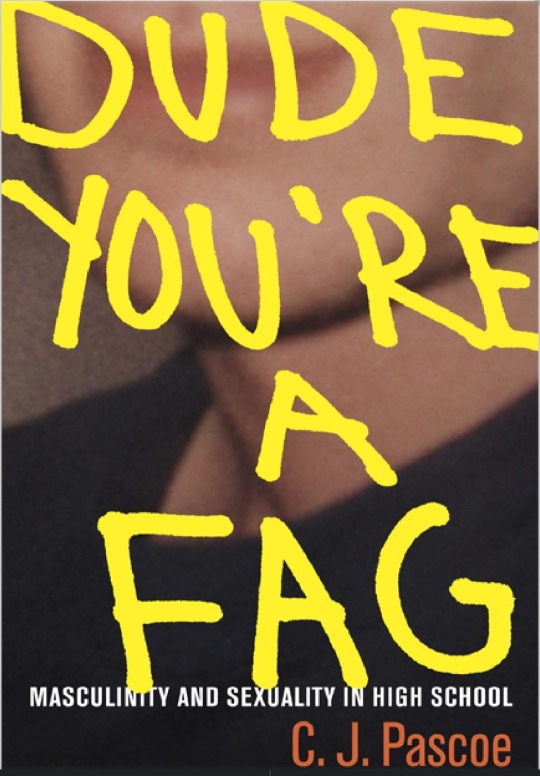
This is a fucking great book but the cover makes it impossible to carry around in public
7K notes
·
View notes
Text
The family is where most of the world's rapes take place, and also most of the murders. Nobody has more chances to rob, abuse, blackmail, manipulate, hit or touch you without consent than your family. It would be logical that announcing an intention of "treating you like family" (as many airlines, restaurants, banks, shops and workplaces do) would be considered as a horrible threat. However, to metaphorically be "family" in the eyes of someone, makes you think of having access to something... quite unfamiliar. Namely: approval, solidarity, a promise to help, embrace, and to take care
Sophie Lewis, Abolish the Family: a Manifesto for Care and Liberation, 2022
2K notes
·
View notes
Text
we never should have let cis people get away with “sex is biological, gender is social”
10K notes
·
View notes
Text
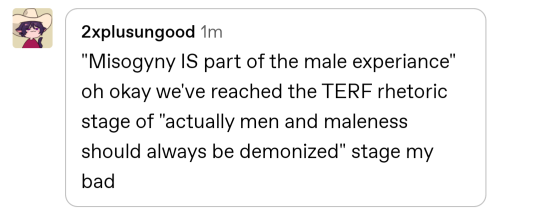
Remember when "we live in a patriarchal society so men have to work on actively unlearning the the cultural misogyny that they're raised to buy into and benefit from" was actually like a commonly accepted belief on this website. Like ten years ago that was just something that most people understood as a baseline.
And now when you try and say that a bunch of people who never actually learned how to do anything but parrot whatever talking points are in vogue say "oh you think men and maleness, categories I'm rhetorically including trans women in, are ontologically evil? Gotcha" and somehow think they're cooking
4K notes
·
View notes
Text
gonna be honest “terfs aren’t real feminists” has the same energy as “real christians aren’t homophobic” lol. I think you are sticking your head in the sand if you refuse to acknowledge the deep allegiances that many feminist movements have had and continue to have to cissexualism & heterosexualism. terfs come from a feminist tradition that is overwhelmingly represented in academia, in feminist policy & organising, in feminist history. like the base belief that there are real, irreconcilable differences between “the two sexes” is not merely taken for granted as true but is treated as outside the domain of fact altogether, it precedes fact, it is treated as akin to stating the sky is blue. we never have to state the sky is blue, it is treated as self-evident. to even state the sky is blue implies a reality where it is not. that is the level that binary sex is treated in many, many forms of political thought, feminist and otherwise. challenging this transcendental truth doesn’t just implicate terfs, it implicates many forms of feminism + by extension the intellectual traditions that these movements come out of. the task at hand is not to downplay or dismiss this history but to challenge it directly. terfs are feminists and their beliefs are destructive to many forms of human life on the planet, and that is not a contradiction
2K notes
·
View notes
Text
some peoole act like youre waterboarding them if you want to talk about women instead of men
15K notes
·
View notes
Text
At the lesbian meetup, met a kind of transphobic woman. Started gearing up to get fighty and then realised... she wasn't an actual terf. She was just older, genuinely didn't know stuff, had heard some terf talking points in passing and had been made kind of anxious by them, but hadn't made it her entire personality. She was open to learning that trans women weren't actually roaming around coercing unwilling cis lesbians into sex, thanked me earnestly for giving her a basic explanation of what "non-binary" meant and truly seemed to be relaxing bit by bit the more she heard. Obviously I'm aware that I can't be sure I've given her a sufficient dose of anti-transphobe vaccine to immunise her permanently against the shit that's out there, but overall it made me hopeful. Most people just aren't dyed-in-the-wool bigots. People can be curious and relieved to hear the fearmongering they've been exposed to is untrue. Telling people this stuff isn't a lost cause.
26K notes
·
View notes
Text
I really do think some people conceptualize egg jokes as like, something that transfems employ as a form of psychological warfare to indoctrinate their friend group with zero reflection on how we as a class have so little cultural cachet that attempting anything even close to that is basically social suicide
5K notes
·
View notes
Text
Women's Not So Distant History
This #WomensHistoryMonth, let's not forget how many of our rights were only won in recent decades, and weren’t acquired by asking nicely and waiting. We need to fight for our rights. Here's are a few examples:

📍 Before 1974's Fair Credit Opportunity Act made it illegal for financial institutions to discriminate against applicants' gender, banks could refuse women a credit card. Women won the right to open a bank account in the 1960s, but many banks still refused without a husband’s signature. This allowed men to continue to have control over women’s bank accounts. Unmarried women were often refused service by financial institutions entirely.
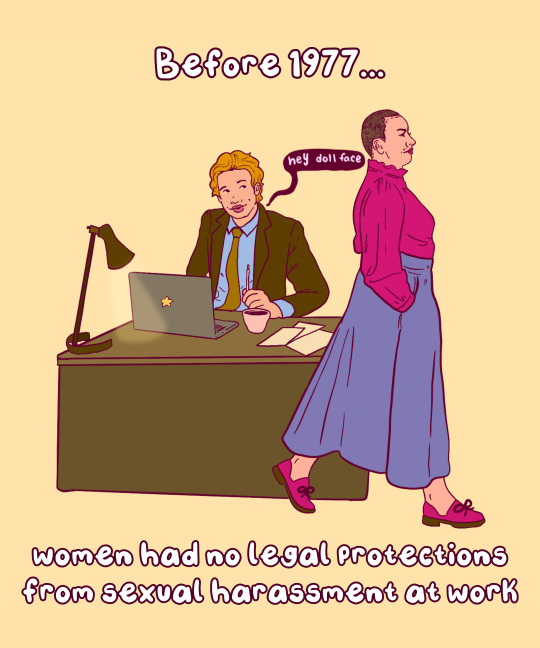
📍 Before 1977, sexual harassment was not considered a legal offense. That changed when a woman brought her boss to court after she refused his sexual advances and was fired. The court stated that her termination violated the 1974 Civil Rights Act, which made employment discrimination illegal.⚖️
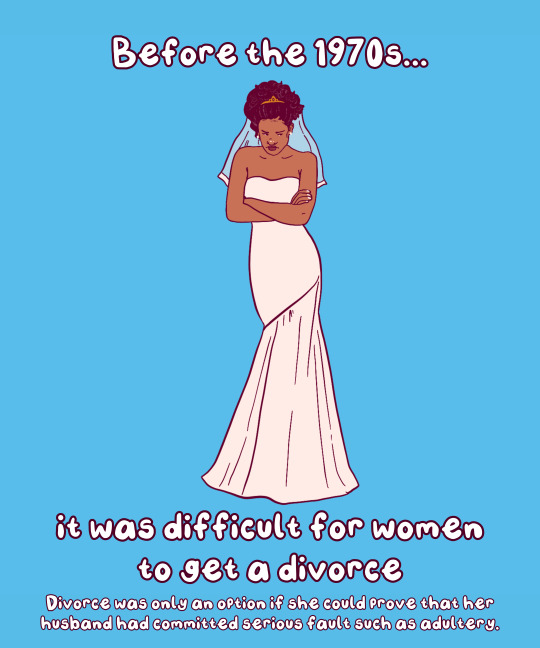
📍 In 1969, California became the first state to pass legislation to allow no-fault divorce. Before then, divorce could only be obtained if a woman could prove that her husband had committed serious faults such as adultery. 💍By 1977, nine states had adopted no-fault divorce laws, and by late 1983, every state had but two. The last, New York, adopted a law in 2010.
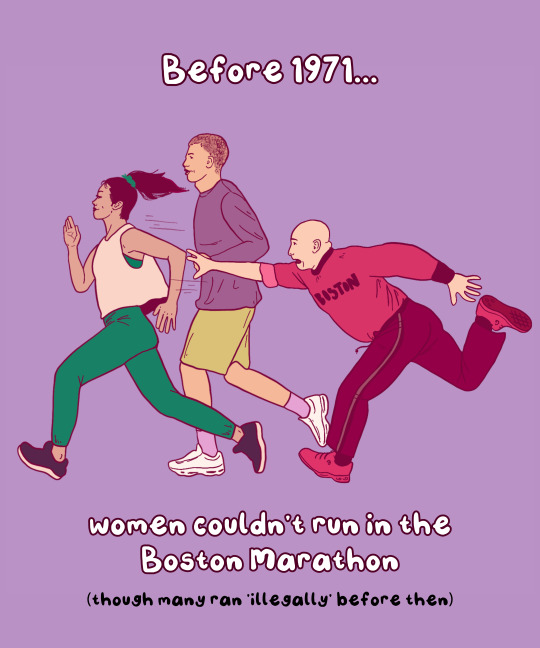
📍In 1967, Kathrine Switzer, entered the Boston Marathon under the name "K.V. Switzer." At the time, the Amateur Athletics Union didn't allow women. Once discovered, staff tried to remove Switzer from the race, but she finished. AAU did not formally accept women until fall 1971.

📍 In 1972, Lillian Garland, a receptionist at a California bank, went on unpaid leave to have a baby and when she returned, her position was filled. Her lawsuit led to 1978's Pregnancy Discrimination Act, which found that discriminating against pregnant people is unlawful
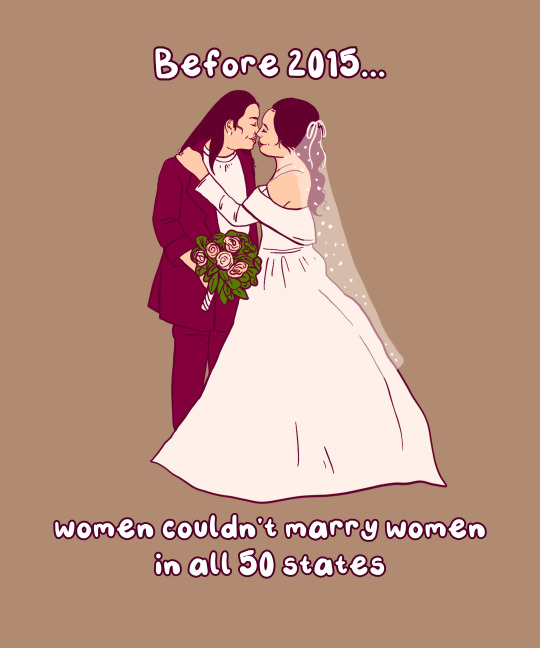
📍 It wasn’t until 2016 that gay marriage was legal in all 50 states. Previously, laws varied by state, and while many states allowed for civil unions for same-sex couples, it created a separate but equal standard. In 2008, California was the first state to achieve marriage equality, only to reverse that right following a ballot initiative later that year.

📍In 2018, Utah and Idaho were the last two states that lacked clear legislation protecting chest or breast feeding parents from obscenity laws. At the time, an Idaho congressman complained women would, "whip it out and do it anywhere,"
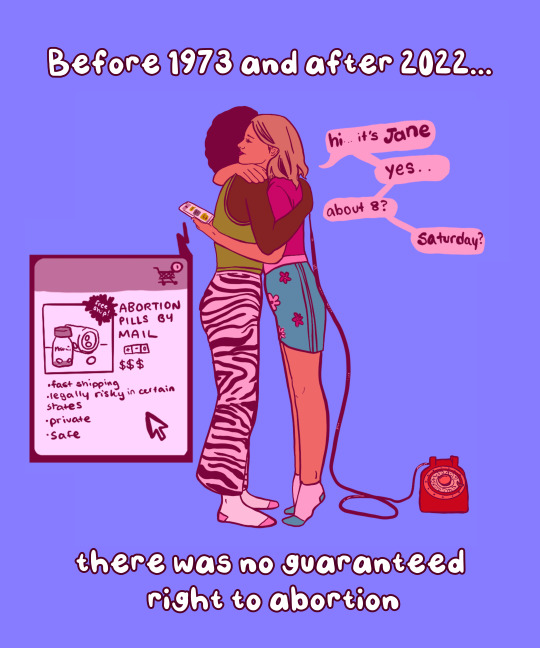
📍 In 1973, the Supreme Court affirmed the right to safe legal abortion in Roe v. Wade. At the time of the decision, nearly all states outlawed abortion with few exceptions. In 1965, illegal abortions made up one-sixth of all pregnancy- and childbirth-related deaths. Unfortunately after years of abortion restrictions and bans, the Supreme Court overturned Roe in 2022. Since then, 14 states have fully banned care, and another 7 severely restrict it – leaving most of the south and midwest without access.
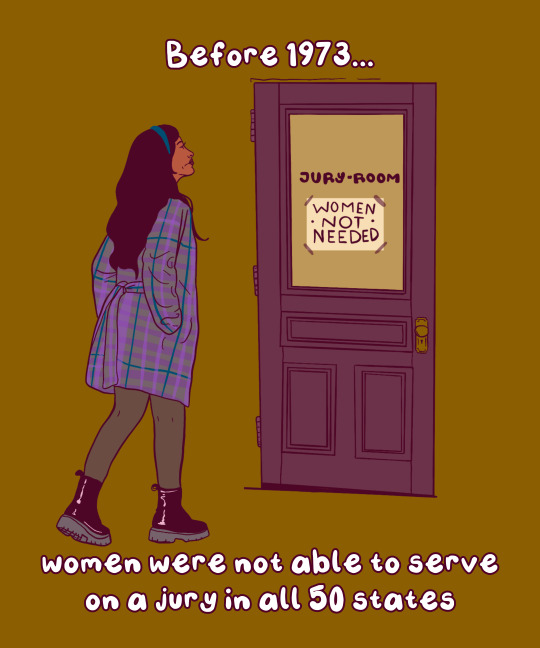
📍 Before 1973, women were not able to serve on a jury in all 50 states. However, this varied by state: Utah was the first state to allow women to serve jury duty in 1898. Though, by 1927, only 19 states allowed women to serve jury duty. The Civil Rights Act of 1957 gave women the right to serve on federal juries, though it wasn't until 1973 that all 50 states passed similar legislation

📍 Before 1988, women were unable to get a business loan on their own. The Women's Business Ownership Act of 1988 allowed women to get loans without a male co-signer and removed other barriers to women in business. The number of women-owned businesses increased by 31 times in the last four decades.
Free download
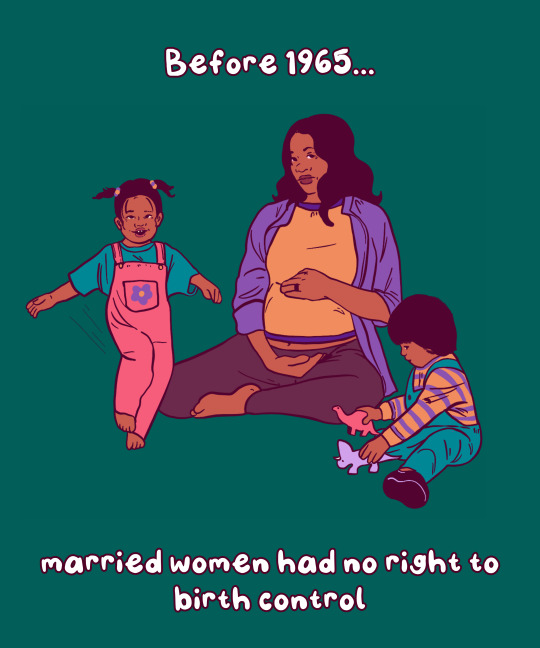
📍 Before 1965, married women had no right to birth control. In Griswold v. Connecticut (1965), the Supreme Court ruled that banning the use of contraceptives violated the right to marital privacy.
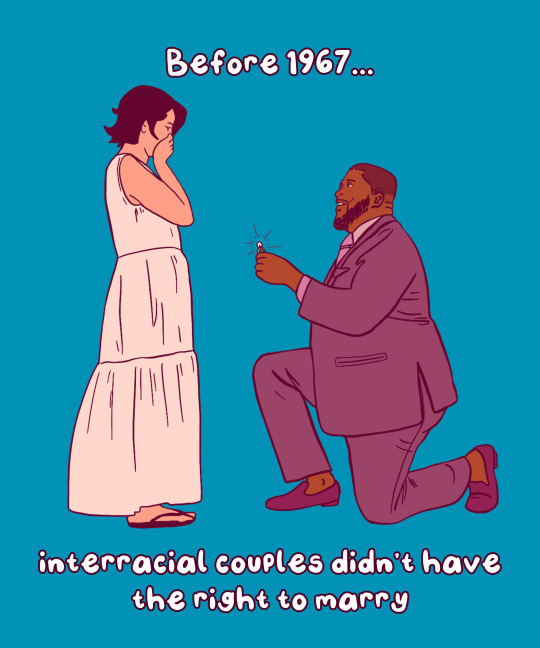
📍 Before 1967, interracial couples didn’t have the right to marry. In Loving v. Virginia, the Supreme Court found that anti-miscegenation laws were unconstitutional. In 2000, Alabama was the last State to remove its anti-miscegenation laws from the books.

📍 Before 1972, unmarried women didn’t have the right to birth control. While married couples gained the right in 1967, it wasn’t until Eisenstadt v. Baird seven years later, that the Supreme Court affirmed the right to contraception for unmarried people.
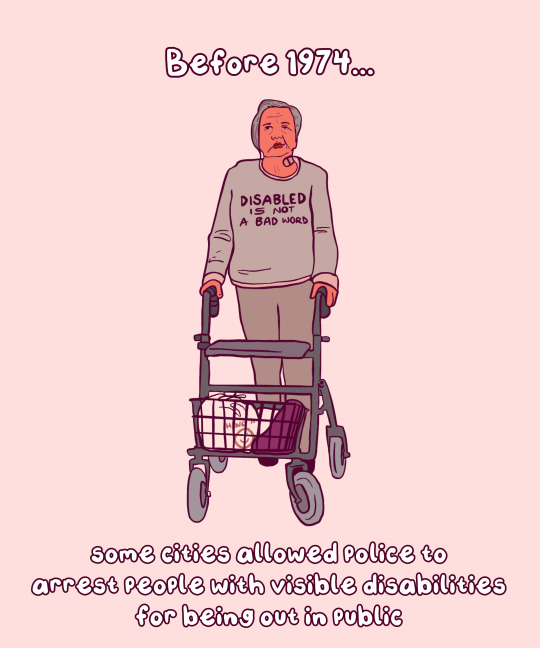
📍 In 1974, the last “Ugly Laws” were repealed in Chicago. “Ugly Laws” allowed the police to arrest and jail people with visible disabilities for being seen in public. People charged with ugly laws were either charged a fine or held in jail. ‘Ugly Laws’ were a part of the late 19th century Victorian Era poor laws.

📍 In 1976, Hawaii was the last state to lift requirements that a woman take her husband’s last name. If a woman didn’t take her husband’s last name, employers could refuse to issue her payroll and she could be barred from voting.

📍 It wasn’t until 1993 that marital assault became a crime in all 50 states. Historically, intercourse within marriage was regarded as a “right” of spouses. Before 1974, in all fifty U.S. states, men had legal immunity for assaults their wives. Oklahoma and North Carolina were the last to change the law in 1993.
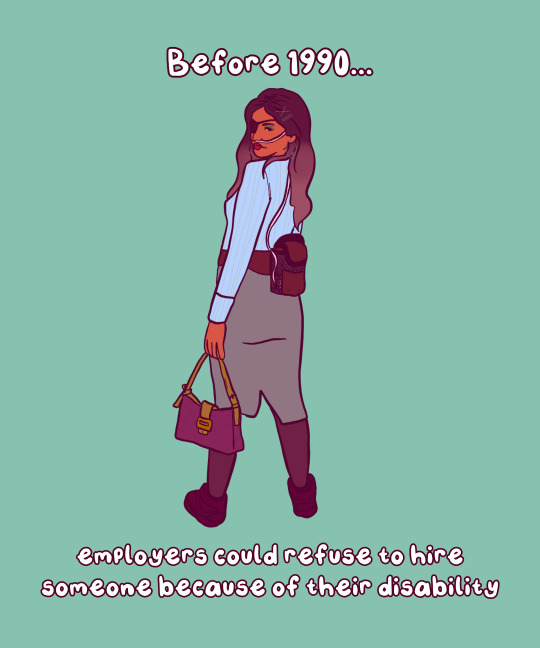
📍 In 1990, the Americans with Disability Act (ADA) – most comprehensive disability rights legislation in U.S. history – was passed. The ADA protected disabled people from employment discrimination. Previously, an employer could refuse to hire someone just because of their disability.
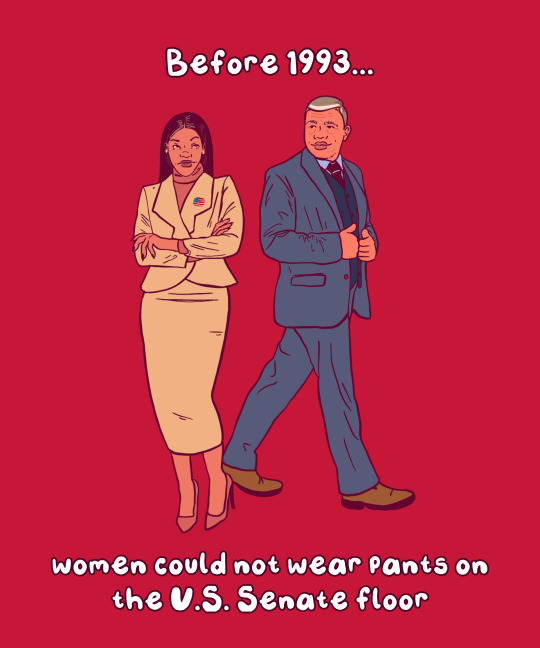
📍 Before 1993, women weren’t allowed to wear pants on the Senate floor. That changed when Sen. Moseley Braun (D-IL), & Sen. Barbara Mikulski (D-MD) wore trousers - shocking the male-dominated Senate. Their fashion statement ultimately led to the dress code being clarified to allow women to wear pants.

📍 Emergency contraception (Plan B) wasn't approved by the FDA until 1998. While many can get emergency contraception at their local drugstore, back then it required a prescription. In 2013, the FDA removed age limits & allowed retailers to stock it directly on the shelf (although many don’t).
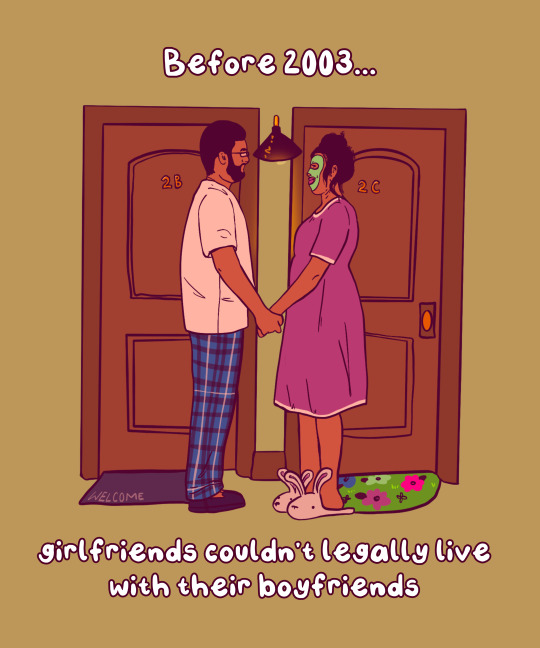
📍 In Lawrence v. Texas (2003), the Supreme Court ruled that anti-cohabitation laws were unconstitutional. Sometimes referred to as the ‘'Living in Sin' statute, anti-cohabitation laws criminalize living with a partner if the couple is unmarried. Today, Mississippi still has laws on its books against cohabitation.
#women's history - usa#feminism - history#usa empire history#i always forget that california had same sex marriage for a year then decided naww#shit is fucked!!#but also we should abolish marriage lol
15K notes
·
View notes
Text
Women's Not So Distant History
This #WomensHistoryMonth, let's not forget how many of our rights were only won in recent decades, and weren’t acquired by asking nicely and waiting. We need to fight for our rights. Here's are a few examples:

📍 Before 1974's Fair Credit Opportunity Act made it illegal for financial institutions to discriminate against applicants' gender, banks could refuse women a credit card. Women won the right to open a bank account in the 1960s, but many banks still refused without a husband’s signature. This allowed men to continue to have control over women’s bank accounts. Unmarried women were often refused service by financial institutions entirely.

📍 Before 1977, sexual harassment was not considered a legal offense. That changed when a woman brought her boss to court after she refused his sexual advances and was fired. The court stated that her termination violated the 1974 Civil Rights Act, which made employment discrimination illegal.⚖️

📍 In 1969, California became the first state to pass legislation to allow no-fault divorce. Before then, divorce could only be obtained if a woman could prove that her husband had committed serious faults such as adultery. 💍By 1977, nine states had adopted no-fault divorce laws, and by late 1983, every state had but two. The last, New York, adopted a law in 2010.

📍In 1967, Kathrine Switzer, entered the Boston Marathon under the name "K.V. Switzer." At the time, the Amateur Athletics Union didn't allow women. Once discovered, staff tried to remove Switzer from the race, but she finished. AAU did not formally accept women until fall 1971.

📍 In 1972, Lillian Garland, a receptionist at a California bank, went on unpaid leave to have a baby and when she returned, her position was filled. Her lawsuit led to 1978's Pregnancy Discrimination Act, which found that discriminating against pregnant people is unlawful

📍 It wasn’t until 2016 that gay marriage was legal in all 50 states. Previously, laws varied by state, and while many states allowed for civil unions for same-sex couples, it created a separate but equal standard. In 2008, California was the first state to achieve marriage equality, only to reverse that right following a ballot initiative later that year.

📍In 2018, Utah and Idaho were the last two states that lacked clear legislation protecting chest or breast feeding parents from obscenity laws. At the time, an Idaho congressman complained women would, "whip it out and do it anywhere,"

📍 In 1973, the Supreme Court affirmed the right to safe legal abortion in Roe v. Wade. At the time of the decision, nearly all states outlawed abortion with few exceptions. In 1965, illegal abortions made up one-sixth of all pregnancy- and childbirth-related deaths. Unfortunately after years of abortion restrictions and bans, the Supreme Court overturned Roe in 2022. Since then, 14 states have fully banned care, and another 7 severely restrict it – leaving most of the south and midwest without access.

📍 Before 1973, women were not able to serve on a jury in all 50 states. However, this varied by state: Utah was the first state to allow women to serve jury duty in 1898. Though, by 1927, only 19 states allowed women to serve jury duty. The Civil Rights Act of 1957 gave women the right to serve on federal juries, though it wasn't until 1973 that all 50 states passed similar legislation

📍 Before 1988, women were unable to get a business loan on their own. The Women's Business Ownership Act of 1988 allowed women to get loans without a male co-signer and removed other barriers to women in business. The number of women-owned businesses increased by 31 times in the last four decades.
Free download

📍 Before 1965, married women had no right to birth control. In Griswold v. Connecticut (1965), the Supreme Court ruled that banning the use of contraceptives violated the right to marital privacy.

📍 Before 1967, interracial couples didn’t have the right to marry. In Loving v. Virginia, the Supreme Court found that anti-miscegenation laws were unconstitutional. In 2000, Alabama was the last State to remove its anti-miscegenation laws from the books.

📍 Before 1972, unmarried women didn’t have the right to birth control. While married couples gained the right in 1967, it wasn’t until Eisenstadt v. Baird seven years later, that the Supreme Court affirmed the right to contraception for unmarried people.

📍 In 1974, the last “Ugly Laws” were repealed in Chicago. “Ugly Laws” allowed the police to arrest and jail people with visible disabilities for being seen in public. People charged with ugly laws were either charged a fine or held in jail. ‘Ugly Laws’ were a part of the late 19th century Victorian Era poor laws.

📍 In 1976, Hawaii was the last state to lift requirements that a woman take her husband’s last name. If a woman didn’t take her husband’s last name, employers could refuse to issue her payroll and she could be barred from voting.

📍 It wasn’t until 1993 that marital assault became a crime in all 50 states. Historically, intercourse within marriage was regarded as a “right” of spouses. Before 1974, in all fifty U.S. states, men had legal immunity for assaults their wives. Oklahoma and North Carolina were the last to change the law in 1993.

📍 In 1990, the Americans with Disability Act (ADA) – most comprehensive disability rights legislation in U.S. history – was passed. The ADA protected disabled people from employment discrimination. Previously, an employer could refuse to hire someone just because of their disability.

📍 Before 1993, women weren’t allowed to wear pants on the Senate floor. That changed when Sen. Moseley Braun (D-IL), & Sen. Barbara Mikulski (D-MD) wore trousers - shocking the male-dominated Senate. Their fashion statement ultimately led to the dress code being clarified to allow women to wear pants.

📍 Emergency contraception (Plan B) wasn't approved by the FDA until 1998. While many can get emergency contraception at their local drugstore, back then it required a prescription. In 2013, the FDA removed age limits & allowed retailers to stock it directly on the shelf (although many don’t).

📍 In Lawrence v. Texas (2003), the Supreme Court ruled that anti-cohabitation laws were unconstitutional. Sometimes referred to as the ‘'Living in Sin' statute, anti-cohabitation laws criminalize living with a partner if the couple is unmarried. Today, Mississippi still has laws on its books against cohabitation.
15K notes
·
View notes
Text
witnessing young girls trying to mature too fast knowing i cant save them all

15K notes
·
View notes
Text
I believe it was the work of legal scholar Florence Ashley where I first encountered this term (it might have also been Serano), but I’m becoming more and more committed to saying “degender” as opposed to “misgender.” like I think the term ‘misgender’ fails to properly identify the mechanism behind the process it describes: misgendering is not an act of attributing the wrong gender characteristics to a trans person, it is an act of dehumanisation. I think the term ‘misgender’ especially gives people much easier rhetorical cover to argue that trans women are hurt by misandry by being ‘mislabeled as men,’ or that they are in fact ‘actually men’ and benefit from male privilege, because the (incorrect) assumption underlying this is that when trans women are ‘misgendered’ they are being treated like men - to follow this line of thinking to its natural conclusion, this denies the existence of transmisogyny altogether, because any ‘misgendering’ of trans women is done only with the intent, conscious or otherwise, to inscribe the social position (and the privileges this position affords) of men onto them, as opposed to stripping them of their womanhood (and thus, their humanity).
The term degendering, however, I think more accurately describes this dehumanising process. Pulling from the work of both Judith Butler and Maria Lugones, gender mediates access to personhood - Lugones says in the Coloniality of Gender that in the colonial imaginary, animals have no gender, they only have (a) sex, and so who gets ‘sexed’ and who gets ‘gendered’ is a matter of who counts as human. She describes this gendering process as fundamentally colonial and emerging as a colonial technology of power - who is gendered is who gets to be considered human, and so the construction of binary sex is a way of ‘speciating’ or rendering non-human the Indigenous and African people of colonized America, justifying and systematising the brutal use of their land and/or their labour until their death by equating them to animals. Sylvia Wynter likewise describes in 1492: A New World View that a popular term used by Spanish colonizers to describe the indigenous people was “heads of Indian men and women,” as in heads of cattle. By the same token, white men are granted the high status of human, worthy of governance, wealth, and knowledge production, and white women are afforded the subordinate though still very high responsibility of reproducing these men by raising and educating children. Appeals to a person’s sex as something more real, more obvious, or ‘poorly concealed’ by their gender is to deny them their gender outright, and therefore is a mechanism to render them non-human. Likewise, for Butler, gender produces the human subject - to be outside gender is to be considered “unthinkable” as a human being, a being in “unliveable” space.
Therefore the process of trans women going from women -> “male” is not “being gendered as a man,” it is being positioned as non-human. when people deny the gender of trans women, most especially trans women of colour, they invariably do this through reference to their genitals, to their ‘sex,’ as something inescapable, incapable of being concealed - again, this is not a process of rendering them as men, it is the exact opposite: it is a process of rendering them as non-human. there is not a misidentification process happening, they are not being “misgendered as men,” there is a de-identification of them as human beings. Hence, they are not misgendered, they are degendered, stripped of gender, stripped of their humanity
#transgender - society#transsexuality - history#colonialism#binary sex - colonialism#i also like the term ungendered for the same reasons!!#trans feminism#sex assignment is always coercive and literally racist
2K notes
·
View notes
Text
"Communists" who don't support femminism, gender equality, gay/trans liberation, and land back:
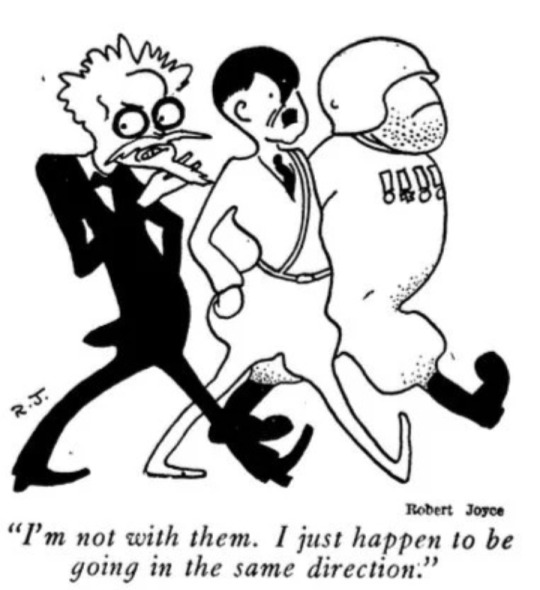
220 notes
·
View notes
Text
No wonder “gender identity,” understood by well-meaning LGBTQ+ advocates as an abstract feeling, has done such a poor job of justifying sex change. If biological sex is part of a material structure of value, then society has a concrete interest in any potential gains or losses that may result, feelings be damned.
Gill-Peterson tells the story of Robert Stonestreet, a 10-year-old boy who was brought to the Johns Hopkins Hospital for a rare urethral defect in 1915. When the doctors informed his father that the boy had ovaries and should be reassigned as a girl, the man refused, explaining that he already had six girls at home and his son was a great help around the family farm. Of course, Stonestreet was prepubescent. Whatever biological advantage he had over his sisters was the natural spoils of working daily on a farm. The point is that his father’s social validation of his gender was the basically incidental result of an economic calculation about his sex. Twenty-one years later, Stonestreet asked the same doctors to certify him as male so he could wed his fiancée. They refused — one suspects because a marriage with no reproductive potential struck them as dead in the water, especially with the national birth rate at an all-time low. Three days later, Stonestreet committed suicide — the victim of a society that could not make up its mind on how best to make sense of his gender while also extracting value from his sex.
This is the larger historical reason why the anti-trans movement does not want transgender people to receive sex-altering care. It is not clear how, if at all, such people will fit into the division of sex in America.
-Andrea Long Chu
6K notes
·
View notes
